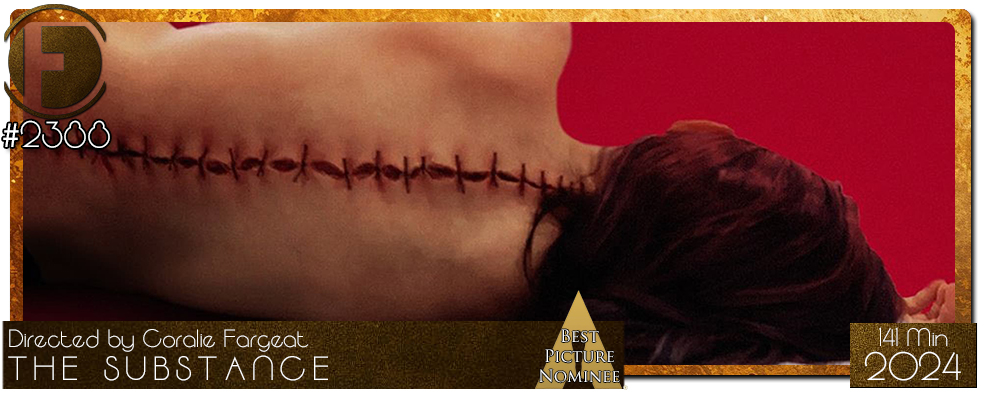Movie Review – Substance, The

Principal Cast : Demi Moore, Margaret Qualley, Dennis Quaid, Edward Hamilton, Gore Abrams, Oscar Lesage, Christian Erickson, Robin Greer, Tom Morton, Hugo Diego Garcia, Yann Bean.
Synopsis: A fading celebrity takes a black-market drug: a cell-replicating substance that temporarily creates a younger, better version of herself.
********
Within the space of two feature films – The Substance being her sophomore effort following 2016’s violent female-led thriller Revenge – Coralie Fargeat has instantly moved into semi-cult status as a director with a profundity of voice and a visual aesthetic equivalent to a sledgehammer to the face. Bold, unsubtle and at times bordering on the insane, The Substance is a dynamite explosion of filmmaking virtuosity that demands attention and provokes the most extreme of reactions, although among cinephiles the film has met with almost universal acclaim. It should be stated from the outset that The Substance is not a movie for everyone, and I would argue that a lot of casual viewers will be repulsed by it on many levels, not the least of which is its near constant nudity, a total feminine sexuality depicted with such ferocity and perfunctory there-ness. So be warned: this film goes hard into its themes and narrative, as bitter a pill to swallow as any indictment on beauty and ageism as I’ve ever seen, and a barrage of shocking imagery that will linger long after the schizophrenic closing credits have faded.

Ageing Hollywood star Elisabeth Sparkle (Demi Moore) finds herself out of favour with her television executive boss, Harvey (Dennis Quaid), who wants her replaced as host of a weekly exercise programme. After being involved in an accident, Elizabeth is given access to a mysterious “substance”, a product that will allow her replicate a secondary body to live as her “younger self”, a physical manifestation of an attractive younger woman with whom she will now share existence with – for 7 days, her essence will live as Elizabeth, and 7 days as Sue (Margaret Qualley), a sexy, vampish rising star everyone falls over themselves to suck up to; the process repeats as long as Elizabeth continues to use the substance. However, when Sue decides she doesn’t want to go back to being Elizabeth, and skips out on stabilising herself with fluid extracted from Elizabeth’s lifeless body hidden in a wall cavity, it will have catastrophic consequences for both women.

Confronting, eviscerating, obvious, sadistic; horrifying in every respect, Coralie Fargeat’s highly charged body-horror masterpiece has landed and it will absolutely leave you gutted by the time you’re done. Cronenberg can only wish he was as courageous, and it’s remarkable when you consider that The Substance is only the director’s second feature film. It’s the kind of experience you might expect from a seasoned legend of the medium, not somebody still – comparatively – wet behind the ears, it’s so strong with thematic power. It’s not a “nice” film by any stretch, and the characters, plot and visual tone it takes could be borderline assault committed upon the viewer, but as a bulldozer fable on beauty and society’s expectations around youth and outward appearances there are few projects that rugby-tackle one into submission quite like this. I can already feel myself struggling with adjectives potent enough to describe the viewing experience of The Substance, although if I had to sum it up in one quick cover-grab it would be “a remake of Requiem For A Dream if the drug aspects were replaced by ageism and acceptance” – this is an angry diatribe on the Hollywood’s focus on youth and “the next big thing” at the expense of seasoned, veteran actors/performers, and Fargeat has literally stuck a firecracker in the ass of the whole industry and lit the fuse. Hard to imagine how anyone won’t get the parable intrinsic to the bonkers plot, but I’m sure a lot of industry folks will.

The film also boasts one of Demi Moore’s finest performances. Not this year, not recently, but ever. It’s a fearless, warts-and-all turn from an actress who I typically find somewhat wooden and inefficient with her acting style. Here, Moore absolutely nails the part and delivers one of the most memorable leading lady screen turns in recent memory. Withering in her frank and turgid examination of ageing out in Hollywood – the film industry as a whole represented by a truly rank caricature of producer largesse thanks to Dennis Quaid – Moore commits wholly to the production, often appearing nude in whole sequences in a way that offers no comfort to her star status. This is as honest and bare a performance as I’ve ever seen from her, and I would be shocked – stone cold shocked – if she wasn’t in serious award contention for her work here.

Equally up to the task but far less shocking is the work of Margaret Qualley, as Moore’s younger self, Sue. Qualley is sexy as hell, delivering the requisite amount of terror and lust with the Insta-ready Sue as she desperately tries to climb the popularity ladder once again, and square that with her week-about relationship with the rapidly deteriorating Elizabeth. It’s a second brave portrayal in a film sliding deeply into dark satire, and as a couplet I think both Moore and Qualley ought to be incredibly proud of what they have accomplished here. Dennis Quaid, for his part as the odious Harvey (perhaps a reference to the maggot-like memory of Harvey Weinstein?) is superb, bristling with arrogance and masculine power – something Fargeat’s film also tries to say something about, but perhaps the only thing about the story that feels insufficiently developed – and his brash, outlandish work balances well alongside his female leads.

I feel utterly out of my league in trying to examine the subtext and themes of The Substance with anything other than my position of white, middle-aged male privilege. I recognise the underlying anger beneath Fargeat’s screenplay and bloody, horrifying visuals, and I can sit here and say that I think women will get a lot more out of this movie than most men will – blokes will probably see it for the chance to ogle Demi Moore and Margaret Qualley (perhaps the most meta thing about the film, if I’m honest). Female viewers will probably find the dialogue around age, ageism, sexism, misogyny, beauty, fame, and femininity one of quite profound import. My guess is that Fargeat has attempted to enrage people, to shock them into thinking about how they consider those with youth and beauty on their side, compared to the older, less subjectively attractive women around them. In almost every way, she succeeds.

Days after seeing it, I write this review still uncertain of my complete thoughts on the matter. It’s a brilliant film, but it’s very, very difficult to recommend without some content warnings plastered all over the cover. There’s some sublime body horror here that will look absolutely bananas to casual audiences, and adored by gore-hounds – my god, the final twenty minutes of this movie are batshit insane! – and again, I warn you that you will not be fully prepared for what The Substance delivers in its brutally hypnotic two-hours-plus runtime. This is definitely not a film you can have on while the kids are in the room, and by the end of it I’m entirely sure even you’ll not want to be in the room with it, it’s so confronting. It’s also incredibly well made, by a director who understands the medium more than most, and wants to tear from her brain all the rage and anger that’s no doubt percolating there as she writes her scripts. I’d be incredibly surprised if there was a Best Picture in its future, but for direction and the two supreme female leading performances, I’m pretty confident few will approach what Moore and Qualley do on screen this year. The Substance is essential 2024 cinema, not to be missed, and an absolutely incredible sophomore effort from Coralie Fargeat.
